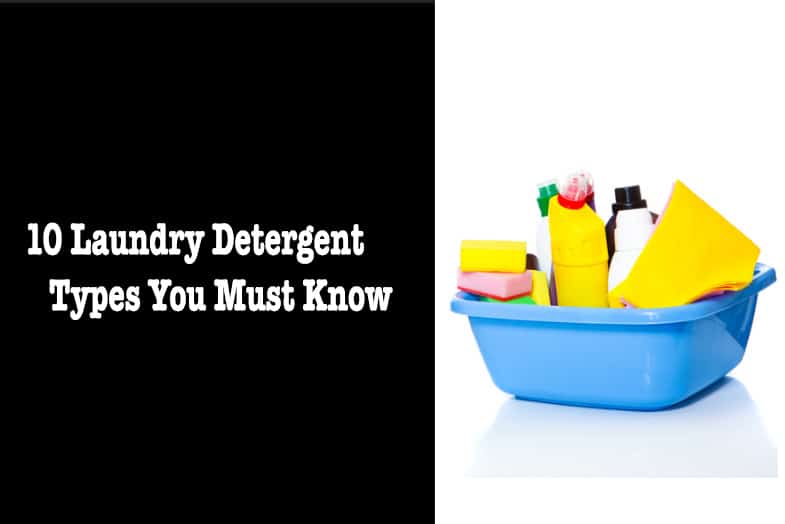Purchasing a laundry detergent was not a big issue of concern for me until my colleague told me about skin itching and rash that occurred to him due to laundry detergent. I did not bother much about it until he showed me rashes on his arms and legs. He told how every part of his body itched wherever the clothes touched him. I became anxious about the detergent I was using. That was the day, and today it is. I never bought laundry detergent again without reading the ingredients.
Laundry detergent plays an integral part in how our skin acts. When our skin is exposed to toxic laundry detergent ingredients through clothes, it starts breaking out. Therefore, we should always pay attention to the detergent we buy. Detergents are of several types. Read to the end to find out which one is the best for you.
What is Laundry Detergent?
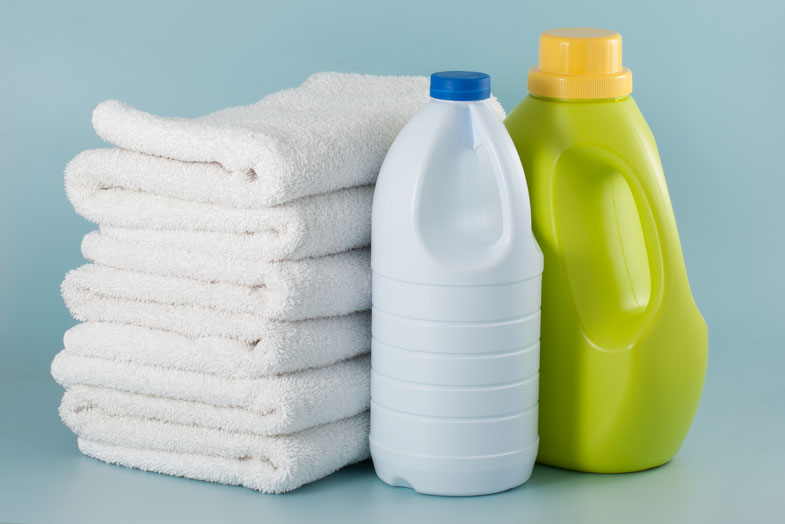
Detergents are always confused with soaps and considered as the same thing. Though they both perform a similar function, their entire chemical makeup is different from each other. Soap is made more of natural ingredients, but detergent is a synthetic compound.
Laundry detergent is a synthetic compound that contains little to no organic chemicals. The major ingredients of laundry detergent include surfactants, perfumes, dyes, sulfates, phosphates, optical brighteners, and enzymes. It is a detergent that cleans laundry. With the presence of so many synthetic chemicals, it cannot be considered biodegradable.
Since the ingredients are all synthetic, they can be harsh on our skin. However, with the right choice of laundry detergent, you can save yourself from several skin problems.
How Laundry Detergent Works?
Water alone does not have the capacity to remove dirt or oil-based stains effectively from the clothes. This is why it is necessary to use laundry detergent. Different ingredients in the laundry detergent act together to take away the stains. Here is how laundry detergent works:
Surfactants: Surfactants play an important role in decreasing the surface tension between water and oil. It removes the dirt from clothes, which is normally difficult to remove. The water and oil-loving ends of soaps bind to water and greasy stains, thus making it easier to remove them.
Bleach: Bleach can be oxygen-based or simply chlorine bleach. Instead of breaking the stain molecules, bleach makes them colorless. By the oxidation process, the soil becomes soluble in water. This makes it easier for water to carry them along.
Read More: Laundry Detergent & Bleach: What’s the Difference?
Brighteners: If bleach is not included in the detergent, brighteners must be added to it. Brightening the clothes makes them look less yellow. Usually, blue dyes are added to white clothes. In the old days, a small amount of blue dye was added to white clothes to keep them whiter; brighteners can be considered an alternative to that blue dye.
Enzymes: The quality and amount of the detergent make a detergent good or bad. If there are fewer enzymes, the detergent is of bad quality, and vice versa. Different types of enzymes are added to the detergent. Enzymes break down the stain molecules to be lifted away from the clothes.
Laundry Detergent Types
There are six major forms of liquid detergent. The detergents are classified on the basis of forms rather than their ingredients. Other than that, detergents are also separated on the basis of their chemical formulation.
1. Liquid Detergent
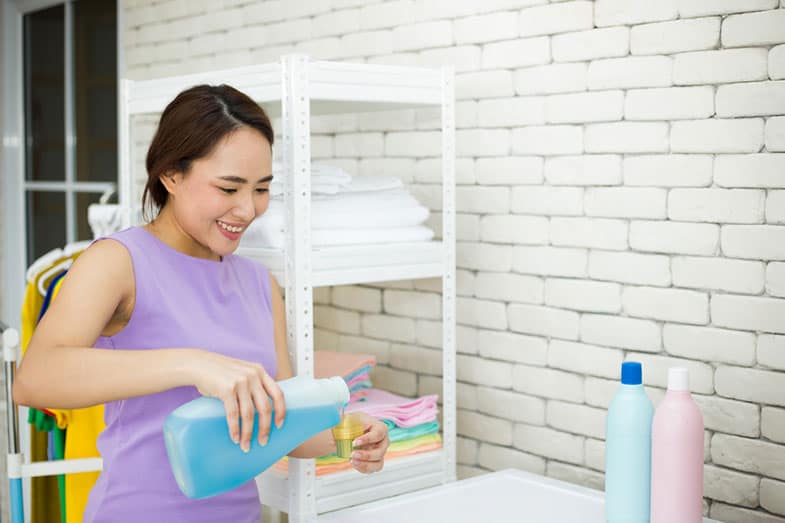
Liquid detergents are most commonly found in households. They are easier to use and work effectively. There are different options for liquid detergents according to colors, that is, whites, dark, and colored. Liquid detergent readily dissolves in water. If you have to deal more with greasy stains, it is recommended to purchase liquid detergent.
Liquid detergents are easier to pour and store than powdered detergents. However, they are quite expensive. Their packaging is made of plastic, which makes them less environmentally friendly.
Read More: Is Liquid Detergent Harmful to Our Health?
2. Powder Detergent
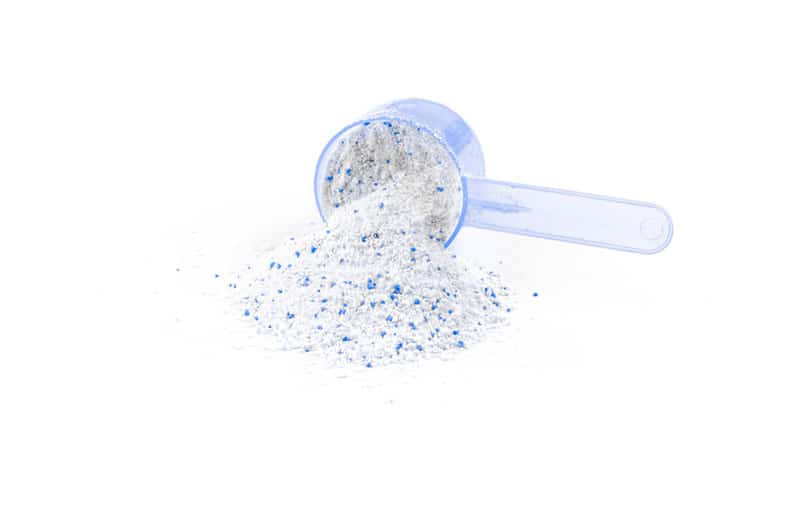
They are less expensive and come in environmentally friendly packaging. The powder is stored in a cardboard or tin box. Powder detergents are also a good option as they contain oxygen bleach, which is not present in liquid detergents.
Powder detergents are formulated with different chemicals and fragrances. This makes them less toxic as the ingredients are kept safe, considering different skin problems.
Besides all these benefits, powder detergents are quite messy. They are also difficult to dissolve in water and also leave a filmy residue on the clothes. Liquid detergents can easily be used as a pretreatment, but powder detergent must be converted into a paste first, which becomes exhausting.
There is a problem with the cardboard packaging. If it gets wet, the cardboard breaks, and then things get messy. Measuring the detergent is also an issue, and it is chaotic.
Read More: Are Liquid Detergents Better than Powder?
3. Detergent Pods
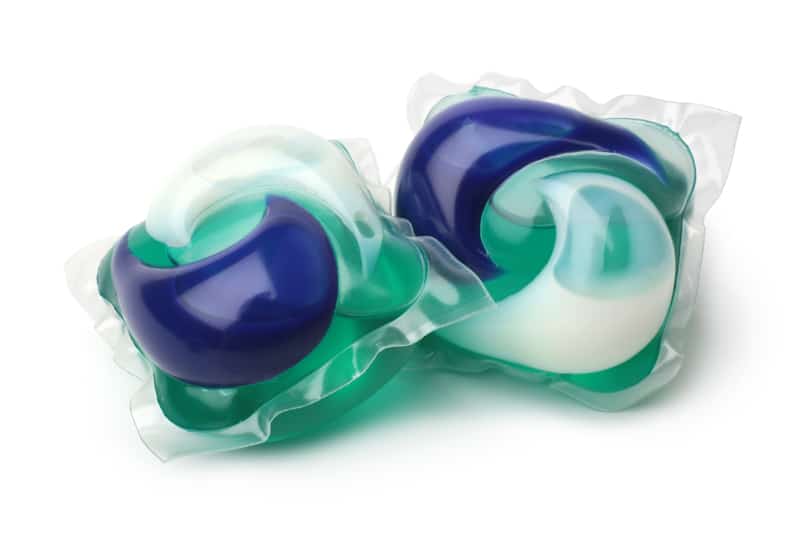
Detergent pods are by far the easiest and most convenient form of detergent to use. They are best for traveling. Therefore, if you are a travel enthusiast, detergent pods will be your friends. The best thing is that these pods do not create any mess. They are made with soluble resin, which dissolves in water to clean the clothes.
Detergent pods have a long shelf life and are easy to use. There is no mess of measuring, as they are pre-measured. They not only act as a detergent but are also beneficial in stain removal, removing bad odor, and brightening the clothes.
Detergent pods are concentrated, which is why they give the best results. Since it comes with so many benefits, pods are the most expensive of all the detergent options. You are also unable to pretreat stains using detergent pods. Since detergent pods are small and hazardous; therefore, you need to store them out of reach of children and pets.
4. Detergent Tablets
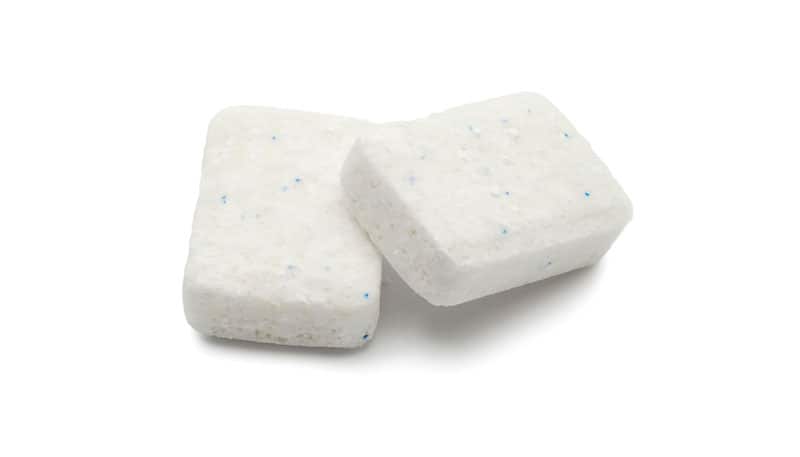
There is not much of a difference between detergent pods and tablets. Detergent tablets are very similar to pods, but there is a little difference. Unlike pods, Tablets are not in gel or liquid form. Also, there is a lack of protective coating.
Detergent tablets, like dishwashing tablets, are in powder form. They are also very convenient to use as they are pre-measured, and therefore, they do not create any mess. Considering the effects of toxic chemicals on sensitive skin, detergent tablets come in several options.
Tablets are difficult to use as they are sometimes ineffective in cooler cycles. They also do not work on smaller loads.
5. Laundry Sheets
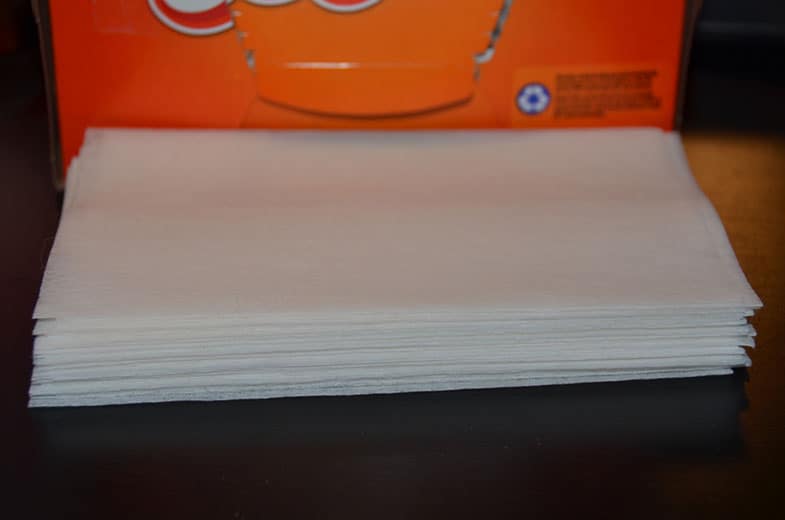
The sheets are another amazing biodegradable and mess-free option. They are very lightweight, which makes them travel-friendly. They are normally made with plant-based ingredients that render them non-toxic and biodegradable.
Laundry sheets work efficiently in both hot and cold water. It has a very powerful cleansing action, which is why laundry sheets work great against all the stains. However, we are unable to use sheets for pretreating. We have to purchase a separate pretreat solution for this purpose.
6. Detergent Balls
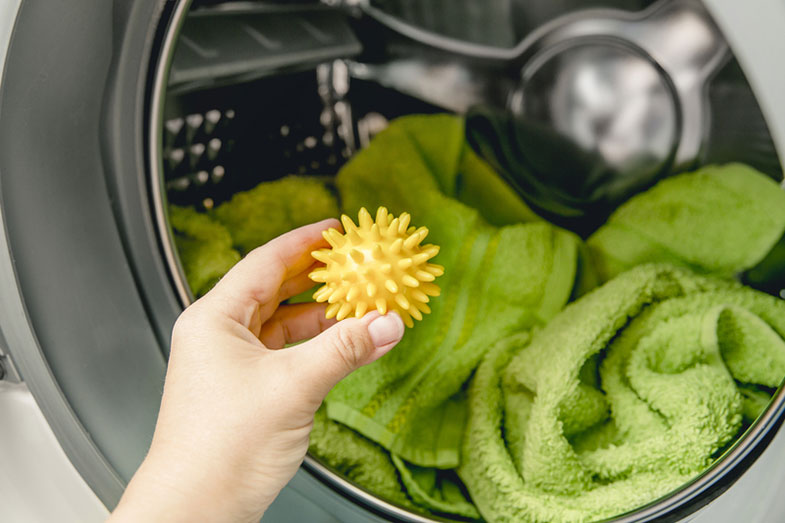
Laundry balls are an eco-friendly way to wash your clothes. A laundry ball is a big rubbery ball-shaped structure that contains many small bio-ceramic balls. Since these balls are made with natural chemicals, the detergent ball is highly biodegradable.
People who are facing skin problems like rash irritation should move from detergent to these balls. You can wash clothes with this detergent ball. If the stains are stubborn, you can add bleach along with it in the washing machine. It does not give a strong smell, as there is no inclusion of synthetic fragrances.
In each laundry ball, there are several small balls. These are Alkali balls – for increasing the level of pH in water, Chlorine-removal balls – for removing chlorine compounds from water, Far Infrared balls – for breaking down water molecules, and anti-microbial balls – for removing pathogenic microorganisms.
I have recently bought these laundry balls, and trust me when I say these are the best alternatives to toxic liquid and powder laundry detergent.
7. Biological Detergent
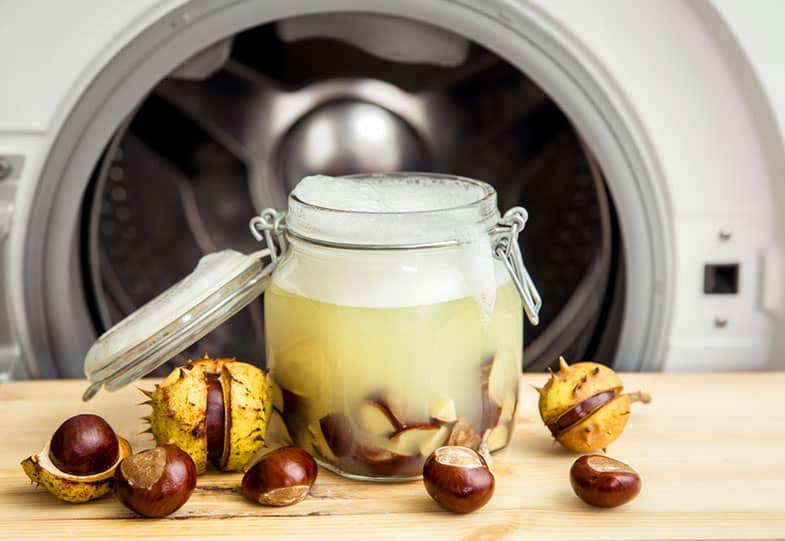
The presence of biological enzymes in the detergent is effective in breaking down different types of stains. The enzymes used in these detergents are able to break down tough and stubborn stains. However, such detergents are not suitable to be used on baby clothes. If you have sensitive skin, you should also avoid using it.
If there is no case of skin problem in your family, or if there are no small babies at home, you can use these biological detergents. Biological detergent is quite convenient to use and removes stains efficiently. Some enzymes present in such detergents include proteases (remove protein stains) and amylases (remove carbohydrate stains).
Biological detergent is a green product, which means it is kind to our ecosystem. You can go for it without any second thought.
8. Non-biological Detergent
These detergents do not contain naturally occurring enzymes. Instead, some other synthetic cleaners are added to boost the cleaning power in order to keep clothes all clean and fresh. Non-bio detergents require slightly hot water to work efficiently.
It works great for families where there are small babies or people with sensitive skin. These detergents are amazing at removing stains. No wonder these detergents contain synthetic cleaners, which is why they cause mild reactions in people with sensitive skin.
It can be used normally as you use other detergents. Add it directly into the washing machine or in the drawer; it is up to you. If you purchase it in liquid form, you can use the detergent for pre-stain treatment.
Read More: Can Your Detergent Impact Your Acne and Skin?
9. Color-safe Detergent
Color-safe detergents are used to wash delicate colored clothes. Such detergent prevents your clothes from fading and losing their brightness. Color-safe detergent effectively removes stains from the clothes while keeping them safe.
Oxygenated bleach is used in its formulation, which helps maintain the cleansing power of the detergent. You can use it in the water at all temperatures. It is safe to say that there is no issue in using color-safe detergent in any type of washing machine.
They bring clothes back to life by brightening their colors. Every greasy and stubborn stain goes away with this detergent easily.
10. Eco-friendly Detergent – Best Laundry Detergent Types
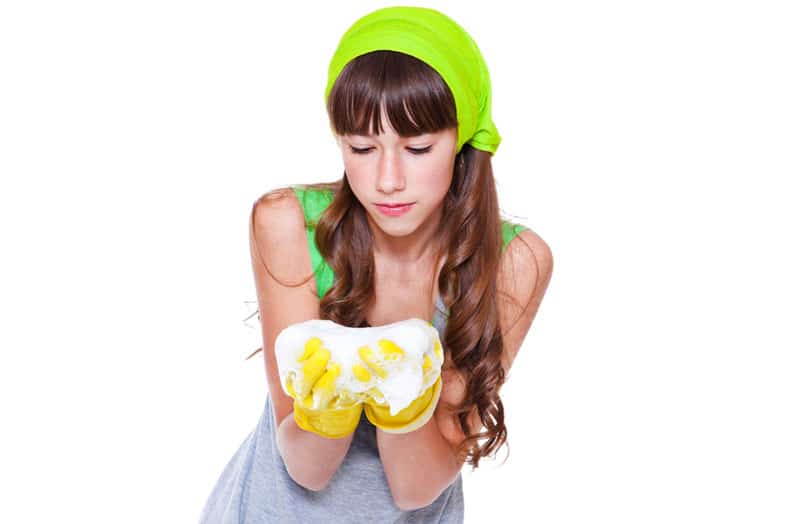
Eco-friendly detergent does not have any deteriorating effect on our environment. The major issue in detergents is packaging and the use of toxic chemicals. Both these issues are considered and tried to minimize. As a result of which, eco-friendly detergents came into existence.
Plant-based ingredients make the best eco-friendly detergent. But this does not mean that every plant-based detergent is the best. Some companies make detergent 65% green, making the rest of the product with synthetic chemicals.
Toxic chemicals in typical detergents damage our bodies in so many ways. The apparent and instant damage it causes is to our skin. Asthma, allergy, and other respiratory disorders are the results of those synthetic chemicals.
Other than that, synthetic ingredients are a threat to aquatic life. Animals living there suffer from such chemicals and die. This is why we should carefully purchase every household product.
Eco-friendly detergents are effective at removing stains from clothes as they are formulated with natural chemicals. There are no fillers or fragrances. You will smell the natural fragrance of your clothes after washing them.
Try eco-friendly detergent and save yourself and your environment from unwanted damage.
Read More: What Makes Laundry Detergent Eco-Friendly?
In Conclusion
This is a list of some of the best laundry detergent types. Seeing a whole list makes it overwhelming to select the right one. But since you have now understood the chemical formulation, benefits, and disadvantages of all these detergents, it will become easier for you to choose.
Take into consideration your budget and your needs. If you are going through any serious skin problem, it is recommended to avoid synthetic detergent. Rather, go for a more natural and green option. The form of detergent you use also has a significant effect on your skin. For instance, liquid detergent can be more harmful as compared to laundry balls or sheets.
Also, before purchasing a detergent, make sure to read the reviews of the customers and do some research yourself. Every brand contains different chemicals for formulation. Therefore, do your research before spending your hard-earned money.

